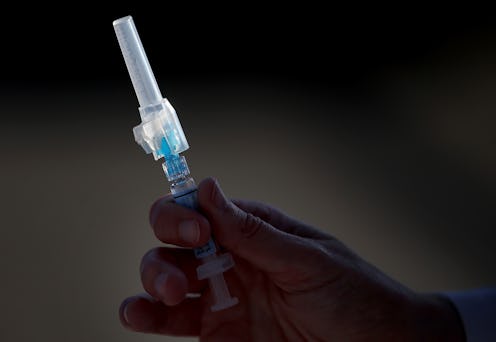News
The California State Senate Tackles Vaccination
For the past several months, the great vaccination debate has been raging throughout the state of California, and for very good reason. Between outbreaks of measles and whooping cough over the past few years — both diseases that are typically scarce and highly avoidable through the use of safe, thoroughly tested vaccines — there's been mounting political pressure to try to force California parents to vaccinate their children. And on Thursday, the legislature took a step in that direction: the California state senate passed a vaccination bill which would close off religious and personal belief exemptions, a policy supported by a majority of Americans.
Here's the basic idea: at present, California parents have options when it comes to getting their kids vaccinated. Thanks to a blend of anti-scientific fearmongering, sincere fears over the rising rates of autism, and a fallacious belief that vaccinations cause cause it, California has become something of a haven for the anti-vaccination movement. They've got celebrities, communities with sky-high rates of unvaccinated kids (like affluent Marin County, of which I'm rarely ashamed to be a native), and even some schools in Los Angeles with lower vaccination rates than war-torn South Sudan.
It's a huge problem, and with the collective health of the state's children on the line, California lawmakers decided to step up. If the bill the state senate passed Thursday eventually becomes law, it'll change the rules on vaccines in a big way — parents will no longer be allowed to cite religious or personal beliefs to get their unvaccinated kids into school, whether it's a public or private institution.
This bill has sparked some controversy, and there are some fair questions to be asked. Obviously, it's crucially important that vaccination rates be kept high, especially in potential disease centers like public schools.
It's a proposition that's been polled at high levels of public support across the country, in fact — a CNN poll in February found that nearly 80 percent of Americans favor these sorts of retrictions, when awarness was raised by the measles outbreak that swept through Disneyland and spread into a number of other states. Moreover, it would represent California falling into line with a majority of other U.S. states, however. As detailed by the Los Angeles Times, 32 states do not offer personal belief exemptions.
When herd immunity weakens, it exposes vulnerable kids to potential infections, and it's worst for the most vulnerable among them — like Corte Madera 6-year-old Rhett Krawitt, who can't get vaccinated because of a weakened immune system from leukemia treatments. As NPR notes, medical exemptions for cases like Krawitt would still be granted, and rightly so. But the religious and personal belief loopholes would be closed off.
But as with any sweeping piece of publicy policy, there are potential pitfalls to consider. Namely: will this actually induce parents to vaccinate, or will it simply cause a surge in home-schooling? The bill doesn't legally require parents to vaccinate regardless of circumstance, only if they want their children to be enrolled in public school. Considering the level of fervency of many anti-vaxxers, it's fair to wonder whether such a law will up rates, or simply cause a spike in home schooling, which would be a rather sad outcome. The kids, after all, aren't the issue here.
Image: Getty Images
